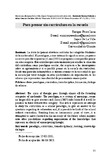Mostrar el registro sencillo del ítem
Para pensar sin currículum en la escuela
| dc.rights.license | http://creativecommons.org/licenses/by-nc-sa/3.0/ve/ | |
| dc.contributor.author | Pérez Luna, Enrique | |
| dc.contributor.author | De La Ville, Zajari | |
| dc.date.accessioned | 2012-06-27T21:18:47Z | |
| dc.date.available | 2012-06-27T21:18:47Z | |
| dc.date.issued | 2012-06-27T21:18:47Z | |
| dc.identifier.issn | 1316-9505 | |
| dc.identifier.uri | http://www.saber.ula.ve/handle/123456789/35535 | |
| dc.description.abstract | La crisis del pensar atraviesa casi todas las categorías fundantes de la modernidad. El paradigma, como sistema de signifi caciones, ya parece no servir para dar respuestas y Lanz (2005) se pregunta si será posible pensar sin esta categoría. Este artículo representa un intento por estudiar la situación del currículum como paradigma escolar, dar respuesta a las interrogantes sobre su agotamiento y si es posible pensar en la escuela sin currículum. Desde una posición hermenéutica se intenta avanzar en la necesidad de que la escuela por venir indague en otras posibilidades de organización de los saberes que representen una alteridad de pensamiento emancipador. | es_VE |
| dc.language.iso | es | es_VE |
| dc.rights | info:eu-repo/semantics/openAccess | |
| dc.subject | Paradigma | es_VE |
| dc.subject | Currículum | es_VE |
| dc.subject | Transdisciplina | es_VE |
| dc.subject | Formación | es_VE |
| dc.title | Para pensar sin currículum en la escuela | es_VE |
| dc.title.alternative | To think without curriculum at school | es_VE |
| dc.type | info:eu-repo/semantics/article | |
| dc.description.abstract1 | The crisis of thought goes through almost all the founding categories of modernity. The paradigm, as a system of meanings, seems no longer able to give answers and, Lanz (2005) asks himself if it will be possible to think without this category. This article represents an attempt to study the curriculum as a scholar paradigm, to give an answer to the questions regarding its exhaustion and, if is possible to think of the school without curriculum. Standing from an hermeneutic point of view, it is attempted to move forward in the necessity of the future school inquires onto other possibilities regarding organization of the knowledges that represent an alterity of emancipating thought. | es_VE |
| dc.description.colacion | 75-91 | es_VE |
| dc.description.email | enriqueperezluna@gmail.com | es_VE |
| dc.description.email | zajaridlv@gmail.com | es_VE |
| dc.description.frecuencia | semestral | |
| dc.subject.facultad | Facultad de Humanidades y Educación | es_VE |
| dc.subject.keywords | Paradigm | es_VE |
| dc.subject.keywords | Transdisciplinary | es_VE |
| dc.subject.keywords | Training | es_VE |
| dc.subject.keywords | Knowledge dialogue | es_VE |
| dc.subject.publicacionelectronica | Revista de Teoria y Didáctica de las Ciencias Sociales | |
| dc.subject.seccion | Revista de Teoría y Didáctica de las Ciencias Sociales: Artículos | es_VE |
| dc.subject.thematiccategory | Artes y Humanidades | es_VE |
| dc.subject.tipo | Revistas | es_VE |
| dc.subject.unidadinv | Grupo de Investigación Teoría y Didáctica de las Ciencias Sociales | es_VE |
| dc.type.media | Texto | es_VE |
Ficheros en el ítem
Este ítem aparece en la(s) siguiente(s) colección(ones)
-
Revista de Teoría y Didáctica de las Ciencias Sociales - Nº 017 - (2011)
Enero - Diciembre 2011


